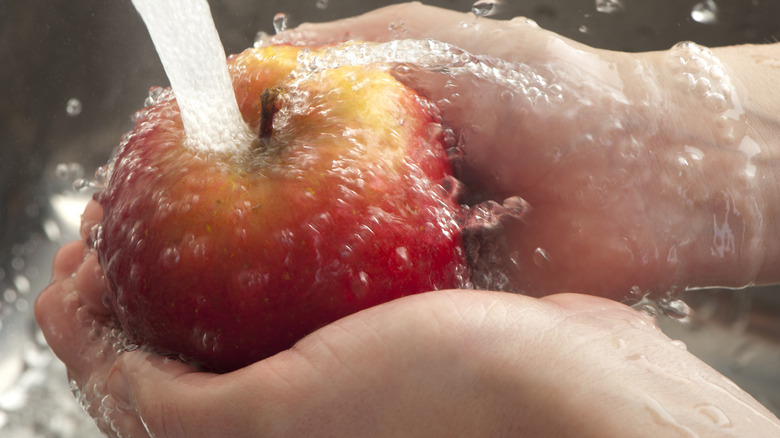Why You Shouldn't Soak Your Fruit In Water
No matter how enticing a piece of fruit may be, you should never bite into it without first giving it a good clean. The same goes for varieties that have a firm skin or a protective rind. In other words, you should never cut unwashed melons or peel unclean oranges. That's because your colorful bowl of raw fruits could be harboring a dirty secret in the form of harmful germs like salmonella and E. coli, pesticide residue, and even bugs. Consuming said mucky fruit could result in a host of health issues, such as food poisoning. But, when it comes to washing the gunk away, there's one method you may want to forgo: soaking fruit in water.
Submerging your fruit in water for a good 15 to 20 minutes may seem like the easiest option for getting them spotless. But the reality is, you could actually be doing more harm than good by spreading those germs to other fruit.
Soaking fruit in water could breed more germs
For the freshest fruit, a water bath isn't the best option. A soak, no matter how short, could actually cause more germs and bacteria to fester as a result of cross-contamination from grime already lurking in the sink. Even in a bowl, the germs present on one strawberry, for example, could spread to another because the water isn't running — it's just sitting stagnant, spreading to other fruit.
Now, that's not to say that this method of sanitization is always ineffective. A 2006 study notes that soaking can, in some cases, be beneficial in reducing the amount of bacteria present — but not with every piece of produce. Plus, it could also leach out essential water-soluble nutrients like vitamin C and other key minerals, similar to what occurs when vegetables are boiled.
But, before you go rushing to wash your fruits the second you get home from the grocery store, it's important to also note that undesirable bacteria can grow when produce is stored — whether it's been cleaned or not. Therefore, it's best to cleanse them right before they're eaten.
Run your fruit under water instead
Taste the rainbow, not the dirt. Although there's not a single method capable of killing off all unwanted microbes, you can rid the vast majority of pesky creepy crawlers and bacteria with cool, running water. Simply run your berries, grapes, pears, and the like under the faucet and gently rub them to remove the filth both seen and unseen.
Another tip: Don't use soap. Even though you may be tempted to, the porous surfaces of many fruits and veggies make them susceptible to potentially unsafe chemicals seeping in. Meaning, they may be bad for your taste buds and your health, too. For this reason, you can also do without the fancy produce washes — especially since that same 2006 study states that plain tap water is equally if not better at ensuring a deep clean. In fact, the study notes that it's the most effective means of washing produce.
For fruits that have a tougher exterior, such as the aforementioned melons, it's best to use a vegetable brush to scrub the muck away. Your fruits have probably never tasted better — or cleaner.



